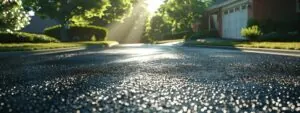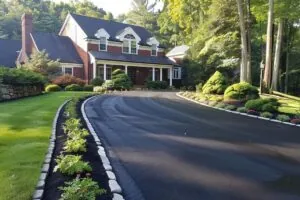
A driveway is a valuable component for any homeowner. It makes moving in and out of the garage easier. That said, it’s best if you take care of it. One of the best ways to take care of your driveway is to seal coat it. Seal coating is a crucial aspect of driveway maintenance, as it offers numerous benefits to your driveway’s aesthetics and longevity.
But you might wonder when the best time to seal your driveway is. Read on because that’s what this blog is all about.
The Best Time for Seal Coating – Factors to Consider
Seal coating is most effective when the conditions are met.
To achieve the best result, it’s essential to consider various factors when applying seal coating to your driveway or pavement.
Here’s an explanation of how timing affects the effectiveness of seal coating:
Weather Conditions
Temperature: Seal coating is typically most effective during warmer months. It requires specific temperature ranges to cure correctly. The temperature for sealing a driveway shouldn’t be too low (below 50°F or 10°C) as the sealer may not dry and cure correctly.
Dry Weather: Ensure there’s no rain in the forecast for at least 24-48 hours after applying the seal coat. Rain can wash away the sealer, reducing its effectiveness.
Surface Preparation
Before sealing your driveway, the surface should be thoroughly cleaned. And any repairs, such as filling cracks, should be completed. Applying sealer to a dirty or damaged surface reduces its effectiveness.
Age of the Pavement
New asphalt should typically be cured for at least 90 days before applying seal coating. This allows the surface to release some of its oils and gases, ensuring better adhesion of the seal coat.
Traffic Load
Minimize traffic on the freshly seal coated surface for at least 24-48 hours. Heavy traffic can damage the sealer before it fully cures, reducing its effectiveness.
Sealant Type
The type of sealant you use can also influence timing. Some sealants are designed for specific conditions, such as hot or cold climates, and may have different optimal application times.
The best time to seal your driveway is when most, if not all, of these factors are favorable.
Optimal Seal Coating Seasons
Spring and fall are the preferred seasons for seal coating in Massachusetts due to their excellent weather conditions and the suitability of these periods for pavement maintenance. These seasons offer moderate temperatures, ideal for adequately curing the sealer. Extreme heat during summer or harsh cold during winter can hinder the curing process.
Applying seal coating in the fall is particularly advantageous in Massachusetts as it provides a protective layer just before the harsh winter season, guarding the pavement against moisture penetration and the formation of cracks and potholes.

Longer daylight hours in spring and fall also facilitate the efficient completion of the process, and reduced traffic during these seasons helps maintain the quality of the seal coating by minimizing the risk of interference with the freshly applied surface.
Related Post: Why You Should Sealcoat Your Driveway
Weather Variability in Massachusetts
Unpredictable weather patterns in Massachusetts can significantly impact the effectiveness of seal coating, requiring careful consideration of timing and preparation. The state experiences a wide range of weather conditions throughout the year, and these unpredictable patterns can affect seal coating in several ways:
Sudden Rain or Storms: Even during seasons generally considered suitable for seal coating, such as spring and fall, Massachusetts can experience unexpected rain and storms.
Temperature Fluctuations: Drastic temperature changes, especially during transitional seasons, are not uncommon. A sudden drop in temperature can slow down or even prevent the curing process of the sealant, resulting in an uneven and less effective seal coating.
Freezing and Thawing Cycles: Massachusetts endures harsh winter conditions with frequent freezing and thawing cycles. Applying seal coating before winter is essential to protect the pavement. However, applying it too early in the spring can lead to problems if there’s a late-season snowfall or extended cold spells.
Humidity and Moisture Levels: High humidity or elevated moisture levels can affect the curing process of seal coating. Excessive humidity can extend the drying time, increasing the risk of debris sticking to the surface, which may negatively impact the final result.
Unpredictable Snowfall: In Massachusetts, unexpected late-season snowfall can disrupt the freshly applied sealer. Snow accumulation can delay the curing process and may require additional maintenance.
Tailoring Advice to Weather Patterns

Adjusting seal coating plans based on current weather conditions is crucial to ensure the effectiveness of the process. Unpredictable weather necessitates flexibility and timely responses.
Donovan Sealcoating, a trusted service provider, can help by offering expert guidance and adapting schedules to match favorable weather windows.
You can reach us at 781-630-4641 to ensure your seal coating is executed under the best weather conditions, enhancing its longevity and protection for your pavement.
Conclusion
Proper seal coating is essential for maintaining the longevity and aesthetics of your driveway. Timing your seal coating is critical, and spring and fall are the optimal seasons for this task in Massachusetts. These seasons offer moderate temperatures, stable weather conditions, and longer daylight hours, making them ideal for achieving the best results.
However, Massachusetts’ unpredictable weather patterns can disrupt the seal coating process. Flexibility in scheduling and adapting to current weather conditions are crucial to ensuring the effectiveness of seal coating.
Choosing an experienced seal coating service provider can make the process more likely to be a success. They know the best time to seal your driveway, and they can constantly adapt to unforeseen conditions.




